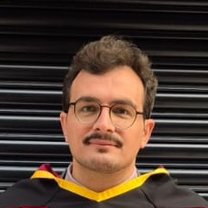Meet Davoud Hosseinnezhad
Originally from Iran, Davoud earned his PhD in Industrial Engineering at the School of Engineering, University of Limerick, Ireland, in January 2025.
In February 2025, Davoud moved to the Netherlands to start a postdoc position at Eindhoven University of Technology (TU/e), where he works in the areas of Operations Research and Simulation Modelling.
Looking back on his PhD, Davoud says: “The title of my PhD studies was: A study on supply chain resilience: vertical and horizontal collaborations, flexible contracts, and digitisation. My PhD research focused on resilience in buyer-supplier relationships. Specifically, I examined how both horizontal (supplier–supplier) and vertical (supplier–buyer) collaboration could enhance supply chain flexibility and resilience, particularly under disruption. My work applied both simulation-based approaches, such as system dynamics and agent-based modelling, and analytical methods, including cooperative and hierarchical game theory. The main emphasis was on proactive actions to build collaborative resilience before disruptions occur.”
During his PhD research, Davoud visited Worcester Polytechnic Institute at Worcester, Massachusetts, USA as part of a visiting research program. During this visit, he had a research collaboration with Sara Saberi and her team at the Business School. Here, they examined the stability of collaboration for block-chain technology adoption in semi-conductor businesses.
In addition to Davoud’s research activities, he also served in a 0.5 FTE lecturing position at the University of Limerick in 2024.
Working towards Agri-Food Supply Chain Resilience
Davoud is specifically hired at TU Eindhoven to help the 4TU.Resilience Engineering preparing for a grant proposal focused on agri-food supply chain resilience in the Netherlands.
This effort is in collaboration with colleagues from TU Delft, TU/e, University of Twente and Wageningen University. The goal is to identify key risks in the Dutch food supply chain and propose multidisciplinary solutions.
Davoud explains: “To contribute to resilience engineering as a multidisciplinary field, I have already started connecting with colleagues from diverse backgrounds. We aim to to create a well-rounded and impactful proposal.”
In addition to preparing for a grant proposal, Davoud continues to publish his research findings. Davoud: “We have recently resubmitted a paper to the well distinguished Production and Operations Management Journal (POMS) and are working on the comments we have received on another submission for EJOR.”
Further reading:
D Hosseinnezhad, YK Nugroho, C Heavey. Horizontal collaboration between suppliers to mitigate supply chain disruption: A secure resource sharing strategy. Computers & Industrial Engineering 177, 109088.
D Hosseinnezhad, C Heavey, YK Nugroho. Resource sharing between suppliers for a flexible recovery during disruption. IFAC-PapersOnLine 55 (10), 655-660
D Hosseinnezhad, M Saidi-mehrabad. Data fusion and information transparency in disaster chain. International Journal of Innovation, Management and Technology 9 (4), 152-159
D Hosseinnezhad, YK Nugroho, C Heavey, S Yeralan. A newsvendor based simulation-optimization model with supply disruption, backup reservation, and deterministic demand. Program and abstract book, 62,
D Hosseinnezhad, C Heavey, F Goodarzi. Application of Hybrid Agent-Based Modeling and System Dynamics Simulation: Collaboration to Improve Supply Chain Resilience. Proceedings of the Operational Research Society Simulation Workshop 2025 (SW25)
